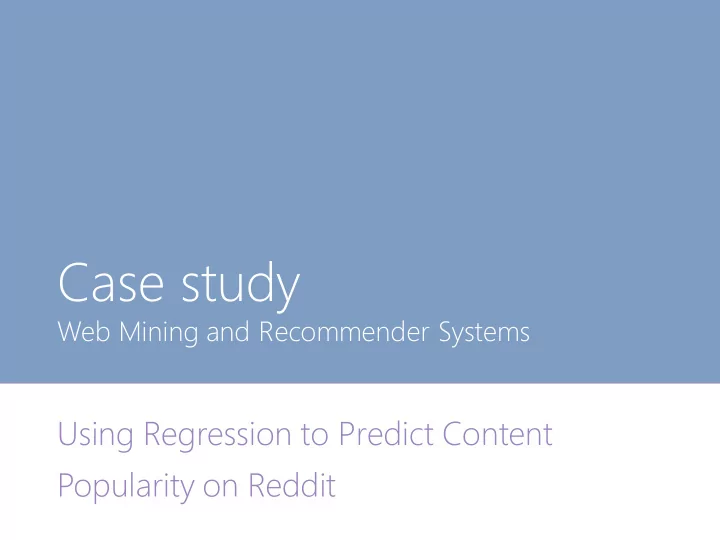

Case study Web Mining and Recommender Systems Using Regression to Predict Content Popularity on Reddit
Images on the web To predict whether an image will become popular , it helps to know Its audience , or the community it was submitted to • Whether it is original compared to previous content • How it was marketed (e.g. its posting title) • (e.g. Bandari et al. 2012; Artzi et al. 2012; Hogg & Lerman 2010; Lee at al. 2010; Petrovic et al. 2011; Tatar et al. 2011, and others)
Predicting success of content on image- sharing communities “ Who will like my content, and how should I market it?” ICWSM 2013 (w/ Lakkaraju & Leskovec)
Resubmissions on reddit.com When social media content is posted, can we determine How much of the How much of the success was due to vs. success was due to how the content the content itself was marketed Why? Changing how content is presented is easier than changing the content itself!
Resubmissions on reddit.com I'm not sure I quite understand this piece 62 Submitted 2 years ago to pics by xxx 24 comments How wars are won Submitted 18 months ago to WTF by xxx 20 1 comment Murica! Submitted 1 year ago to funny by xxx 774 59 comments Bring it on England, Bring it on !! Submitted 10 months ago to pics by xxx 10 4 comments I believe this is quite relevant currently Submitted 7 months ago to funny by xxx 226 15 comments God bless whoever makes these Submitted 1 month ago to funny by xxx 794 34 comments
Understanding popularity 132K submissions, 16.7K original submissions
Resubmissions on reddit.com Community effects Language effects
T emporal effects on reddit
T emporal effects on reddit Resubmissions are less popular (left), but can still be popular if we wait long enough (right)
Inter-community temporal effects Submissions won’t be successful in the same community twice (main diagonal) Submissions won’t be successful if they already succeeded in a big community (low-rank structure)
Model (non-title effects) inherent popularity forgetfulness same community twice decay from resubmissions other communities previous submissions The model is designed to account for five factors: 1. The inherent popularity of the content (i.e., factors other than the title) 2. The decay in popularity due to resubmitting the content 3. This decay should be discounted for old enough submissions 4. A penalty due to resubmitting to another community 5. A penalty due to resubmitting to the same community twice (we also account for other factors, such as the time of day etc.)
Model (title effects) Titles should match Titles should differ from others in the same those previously used community, but should for the same content not be too similar
Regression, and in situ evaluation Performance on held-out test data: Model R 2 Community model only 0.528 Language model only 0.081 Community + language 0.618 We generated pairs of titles for 85 submissions, which we submitted simultaneously to two different communities • The ‘good’ titles garnered three times as many upvotes as the ‘bad’ ones (10,959 vs. 3,438) • Five good titles reached the front page of their community, and two reached the front page of r/all
Example • Good title: What I would do to • Bad title: Funny gif someone I hate • Votes: 300+ 124-, Cmts: 9 • Votes: 7087+ 5228-, Cmts: 518 • Why is this good? • Why is this bad? • Original title • Not original, too generic (no specificity) • Optimal length (not too short) • Short length • POS tags: Interesting (uncommon) sentence structure compared to a • Flat POS tag distribution flat-tone syntax
Conclusion • To understand whether a submission will succeed we must understand the content but also their context • When was the image uploaded? • To which community was it submitted? • What is its title ? • We showed that context can be used to predict what will “go viral” on social media • See the paper on http://cseweb.ucsd.edu/~jmcauley/pdfs/icwsm13.pdf • Joint work with Himabindu Lakkaraju and Jure Leskovec
Recommend
More recommend